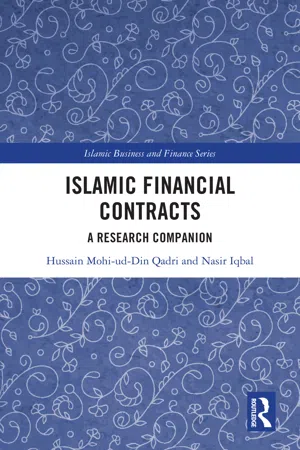
- 264 pages
- English
- ePUB (mobile friendly)
- Available on iOS & Android
About this book
Islam encourages business and financial transactions as a way of securing the basic needs for all human beings, but these need to be conducted in accordance with the principles contained in the Qur'?n and Sunnah. However, these legal concepts are not classified subject-wise, and the verses on commercial law, like all other topics, are scattered throughout the Qur'?n, making it difficult for readers to gain a full understanding of the topic. This, therefore, is the first comprehensive book to demystify Islamic contract law and specifically Islamic financial contracts, and to examine its roots and history.
The book is written in a clear style to allow for a greater understanding of the more challenging and misunderstood areas pertaining to Islamic business and financial contracts. It also contributes a series of chapters which address the market niche and need, concerning Shariah compliance for Islamic financial products and services. The book is divided into 16 chapters in order to provide a holistic and thorough overview of Islamic law of contract. It covers the objections and misconceptions surrounding Islamic business and financial contracts. It also includes the key features and guiding principles of Islamic law of contract and offers technical know-how, illustrating the concept of formation of a contract, as well as the essential elements of a valid contract. The authors also offer a discussion on the system of options under Islamic business and financial contracts and potential solutions to breach of contracts.
The book will serve as a handy reference for scholars and students of Islamic business and finance and Islamic commercial law and will also be beneficial for practitioners as well as legal and judicial officers. It will open new doors for further research in the field of Islamic financial contracts.
Frequently asked questions
- Essential is ideal for learners and professionals who enjoy exploring a wide range of subjects. Access the Essential Library with 800,000+ trusted titles and best-sellers across business, personal growth, and the humanities. Includes unlimited reading time and Standard Read Aloud voice.
- Complete: Perfect for advanced learners and researchers needing full, unrestricted access. Unlock 1.4M+ books across hundreds of subjects, including academic and specialized titles. The Complete Plan also includes advanced features like Premium Read Aloud and Research Assistant.
Please note we cannot support devices running on iOS 13 and Android 7 or earlier. Learn more about using the app.
Information
1 Some basic legal terminologies and concepts
1.1 Concept of Islamic law
1.2 Shariah
1.3 Qur’ānic basis of Shariah
1.4 Fiqh
the knowledge of laws (Ahkam) of the Shariah which are intended to be acted upon, and have been divulged to us by revelation of determined by concurrent decisions of the learned jurists, such knowledge being derived from the sources of law with the power of making current deductions therefrom.
Table of contents
- Cover
- Half-Title
- Series
- Title
- Copyright
- Contents
- Introduction
- 1 Some basic legal terminologies and concepts
- 2 Historical evolution of contracts and codification of Islamic law of contract
- 3 General Theory, nominate contract, freedom of contract and the juristic person
- 4 Key features of business and guiding principles of Islamic contract law
- 5 Meaning and definition of contract in Islamic law
- 6 Constitution or formation of a valid contract
- 7 Parties and their legal capacities
- 8 Subject matter
- 9 Mutual consent and intention to create legal relationship
- 10 Vitiating factors
- 11 Forbidden elements
- 12 Classification of contract
- 13 Cessation and dissolution of contract
- 14 System of options under contract
- 15 Remedies for breach of contract
- 16 Some important contracts
- Bibliography
- Index